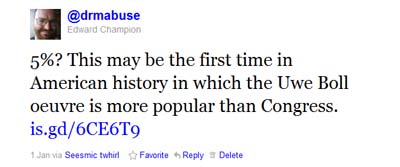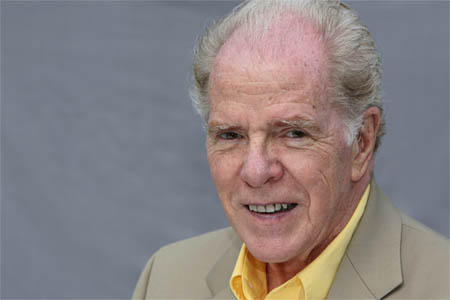Arthur Goldwag appeared on The Bat Segundo Show #435. He is most recently the author of The New Hate.
Listen: Play in new window | Download
PROGRAM NOTE: In Show #430, we asked our listeners if they could share their introvert and extrovert experiences. We received numerous stories and read many on the air at the head of this program.
Condition of Mr. Segundo: Pondering the dangerous possibilities of innate extremism.
Author: Arthur Goldwag
Subjects Discussed: Hate in the heart, Barfly, Richard Hofstadter, the Illuminatus, Glenn Beck, attending a white nationalist convention, how to reason with a crazy person, attempts to talk rationally with a 9/11 truther, conversing with a murderer, catered lunches at white nationalist conventions, the difficulties of spewing cant when the people who oppose it too, Michelle Malkin’s “progressive climate of hate,” Malkin’s hate, why the haters insist that they are the ones who are persecuted, name-calling in blog comments, Gingrich’s lack of ideology and his use of hatred as a demagogic tool, Herman Cain’s meltdown, political sex scandals, people who want to believe that their victims, Thomas Frank‘s Pity the Billionaire, the right mimicking progressive politics, Father Charles Coughlin’s confused ideology, William Buckley’s mission statement for The National Review, Revilo P. Oliver’s conspiracies, rational reactionaries, Robert W. Welch, Jr., the crazy classist idea that America was poisoned by the French Enlightenment, anti-Semitism, Ron Paul, the Weatherman Manifesto, people who believe that they are patriotic Americans, Republican insiders who claim to be outsiders, unrealistic goals of change and creating past political mythologies to house them, the Wild West, innate extremism, William Dudley Pelley‘s crackpot tendencies and fleeting literary career, demagogues who come from shoe factories, the hazards of being a Kabbalist, having a Messiah complex, hateful texts lifted from satirical texts, The Report from Iron Mountain, The Education of Little Tree, haters who are certain that their enemies are having better sex than they are, the Ground Zero mosque and the Christian American Family Association, Democratic cowardice and Harry Reid, Pam Geller, Anders Behring Brevik’s manifesto, Islamophobia, fear and mugging, how New Yorkers reacted to 9/11, Coughlin and the development of hate-oriented talk radio, David Graeber’s Debt, entertainers who don’t have political influence, class rage, Michelle Bachmann, Ann Coulter, Sarah Palin, all-purpose hate fragmenting over the years, and the right-wing crackup.
EXCERPT FROM SHOW:
Correspondent: Arthur, you’re a very huggable guy. But how are you doing?
Goldwag: I have no hate in my heart.
Correspondent: No hate in your heart? Well, let’s get down to this business of hate. I mean, I couldn’t help but think of Mickey Rourke’s line in Barfly when I was reading this. “Hatred! The only thing that lasts!” One of the starting points of this book is Richard Hofstadter’s “The Paranoid Style in American Politics.” He pointed out that status politics was more likely to be expressed in this vindictive sense rather than through a proposal for positive action. So I’m wondering. To what degree is vindictiveness the natural mode of status politics? I mean, why don’t we have a lot more hugging and kissing and love-ins? Why isn’t that more of a draw? Maybe we can start from there.
Goldwag: Well, I think it depends on which side of the status divide you are. And I think on the relatively educated, prosperous side of the status divide, there’s a positive sense of smugness that infuriates the people on the other side of the divide.
Correspondent: Can violence be smug?
Goldwag: Well, that’s kind of the feedback loop of our politics. Weak people get smugger and smugger, and they get more and more infuriated. And it works to the advantage of people that aren’t actually involved in status politics at all. They’re involved in money politics. But it works very much to their advantage.
Correspondent: I’m wondering. Do movements and demagogues tend to time their vindictiveness in any way? I mean, just looking at the various historical examples, have you noticed any specific vindictive trends?
Goldwag: Well, we’re living through such a bad moment. We’re probably living — if America is going the way other big empires have gone, we’re beginning our decline. We’re well into our decline. And there were a lot of people who were doing very well in America who weren’t doing so well anymore. When you look at the history of the United States, when you look at it closely and not in terms of the stories that politicians tell on the stump, you realize there’s been very few good times in this country. I grew up in an age of unprecedented prosperity. But, you know, it was an age of tremendous ideological conflict. It was the civil rights movement. The Vietnam War. But there was a lot of money. Thanks to unions and the New Deal, people that were relatively uneducated were doing pretty well. And that’s not happening anymore.
Correspondent: But why don’t they look at those achievements and say to themselves, “Well, hey, maybe I can be part of that?” Why do they feel the need to be hateful? I mean, is there something inevitably wrong with the political mechanism that forces them to hate. Do people not really have a voice? And is this one of the reasons why they resort to this vindictiveness?
Goldwag: These people actually — they couldn’t answer that question. Because they never describe themselves as haters. I went to a white nationalist convention in Washington a couple of months ago.
Correspondent: Oh yeah?
Goldwag: And over and over again, they told themselves — because there weren’t outsiders there, except me and one or two other reporters. They’re telling themselves, “Look, we don’t hate anybody. Our thing is: we love white people.”
Correspondent: (laughs)
Goldwag: They love whiteness. And I talk about that in the book too. And Hofstadter talks about it when he gets into the status politics. You know, if whiteness is the only thing you have, you’re going to hold onto it very tightly. And then there’s a whole complex of things that go with it that, you know, they’re not bad things. They don’t actually have anything to do with whiteness. I mean, one of the things that I actually learned at this convention is that white people really love their families. But that’s not a white attribute.
Correspondent: No.
Goldwag: But the other side of that, of course, is if you love yourself to the exclusion of somebody else is the somebody else. And there’s the specter in America — you know, it’s a darkening country. One of the speakers who made a very moving speech in a way — he said, “Imagine a country with no blonde women.” That’s like, okay. Imagine that. There’s countries in the world where there are no blonde women. But America, we’re an unusual country. Blood and soil, it’s a much more natural idea in Europe than it is over here. Maybe as things are coming apart over here, it’s starting to become a part of American identity now.
Correspondent: I notice that you offer a smile every time you mention that things will fall apart over here. This leads me to wonder whether, I suppose, the erosion of the American government might in fact encourage people to love each other more. Do you think that hate will actually dissolve once we really don’t have a political mechanism with which to contain it?
Goldwag: I don’t. Because I think that I’m not a religious person. But I believe in the fall of man. On the other hand, I’m not an optimistic person at all. But I believe we’ve made tremendous cultural and spiritual progress in this country. You know, there’s this incredible resentment of our African-American President. But he got elected by a landslide. There’s this incredible homophobia. But in an astonishingly short amount of time, there has been such a raising of consciousness. I would have never imagined ten years ago that gay marriage would be as accepted as it is today.
Correspondent: But we still have white nationalist conventions that you’re attending.
Goldwag: Yeah, but they’re small.
Correspondent: They’re small?
Goldwag: What disturbs me, and what made me write this book — you know, I had written this other book called Cults, Conspiracies, and Secret Societies, and it was encyclopedic. And it was also, it was like a browsing book. And it was like a gee whiz book. Like these are the crazy things that people believed. And after the book came out, some of these people that I had blithely thought were crazy people kind of introduced themselves to me. And I discovered that they’re out there. And then, almost simultaneously with the publication of my book and the inauguration of Barack Obama, it’s the debut of Glenn Beck on FOX News. And Glenn Beck, he’s not on mainstream TV anymore. I don’t want to give him any more credit. He’s an entertainer. But he was channeling all this stuff. I mean, if you had been as immersed in this stuff as I was, none of it was unfamiliar. It’s called the John Birch Society, basically. That’s the template. And the John Birch Society template goes back to the origins of modern Western conspiracy theory, which is that fear of the Illuminatus. People that listen to rap music think the Illuminatus is something new.
Correspondent: But on that subject, in the book, you cite tenuous connections between Michael Jackson and Jay-Z. I mean, how much does the Illuminatus or the Masonic society even matter in 2012 America? I got a lot of historical examples from you.
Goldwag: It matters in the imagination. It matters as an idea. Real Masons are regular people. And some of them are very sophisticated people. But they’re not the figures in the Dan Brown book or the figures on the cover of Jay-Z records. It’s something else. But ideas are important. Human beings live by ideas.
The Bat Segundo Show #435: Arthur Goldwag (Download MP3)


 Scroggings: Well, the idea that Islam is responsible for the oppression of women is a very old idea in the West. It goes back hundreds of years. So it’s got a lot of roots here. So when somebody says that, it basically coincides with what people believe. So that’s one reason. I think with Ayaan Hirsi Ali, what really has made her so popular is her incredibly personal story. It’s very inspiring how she tells it. Her coming to the West. Becoming converted to Western ideas. Shaking off Islam. And then being threatened with death for speaking out against it. A lot of people feel very sympathetic to her and feel inspired by her because of that. So I think that’s really why she’s gained such an influential backing. And as to why she got named the 100 Most Influential People, that came right after the murder of Theo van Gogh. And I think it was sort of a sympathy vote on Time Magazine’s part. Because prior to all this, she was a very new junior legislator in the Dutch Parliament. Not somebody who would normally be considered one of the most influential people in the world.
Scroggings: Well, the idea that Islam is responsible for the oppression of women is a very old idea in the West. It goes back hundreds of years. So it’s got a lot of roots here. So when somebody says that, it basically coincides with what people believe. So that’s one reason. I think with Ayaan Hirsi Ali, what really has made her so popular is her incredibly personal story. It’s very inspiring how she tells it. Her coming to the West. Becoming converted to Western ideas. Shaking off Islam. And then being threatened with death for speaking out against it. A lot of people feel very sympathetic to her and feel inspired by her because of that. So I think that’s really why she’s gained such an influential backing. And as to why she got named the 100 Most Influential People, that came right after the murder of Theo van Gogh. And I think it was sort of a sympathy vote on Time Magazine’s part. Because prior to all this, she was a very new junior legislator in the Dutch Parliament. Not somebody who would normally be considered one of the most influential people in the world.


